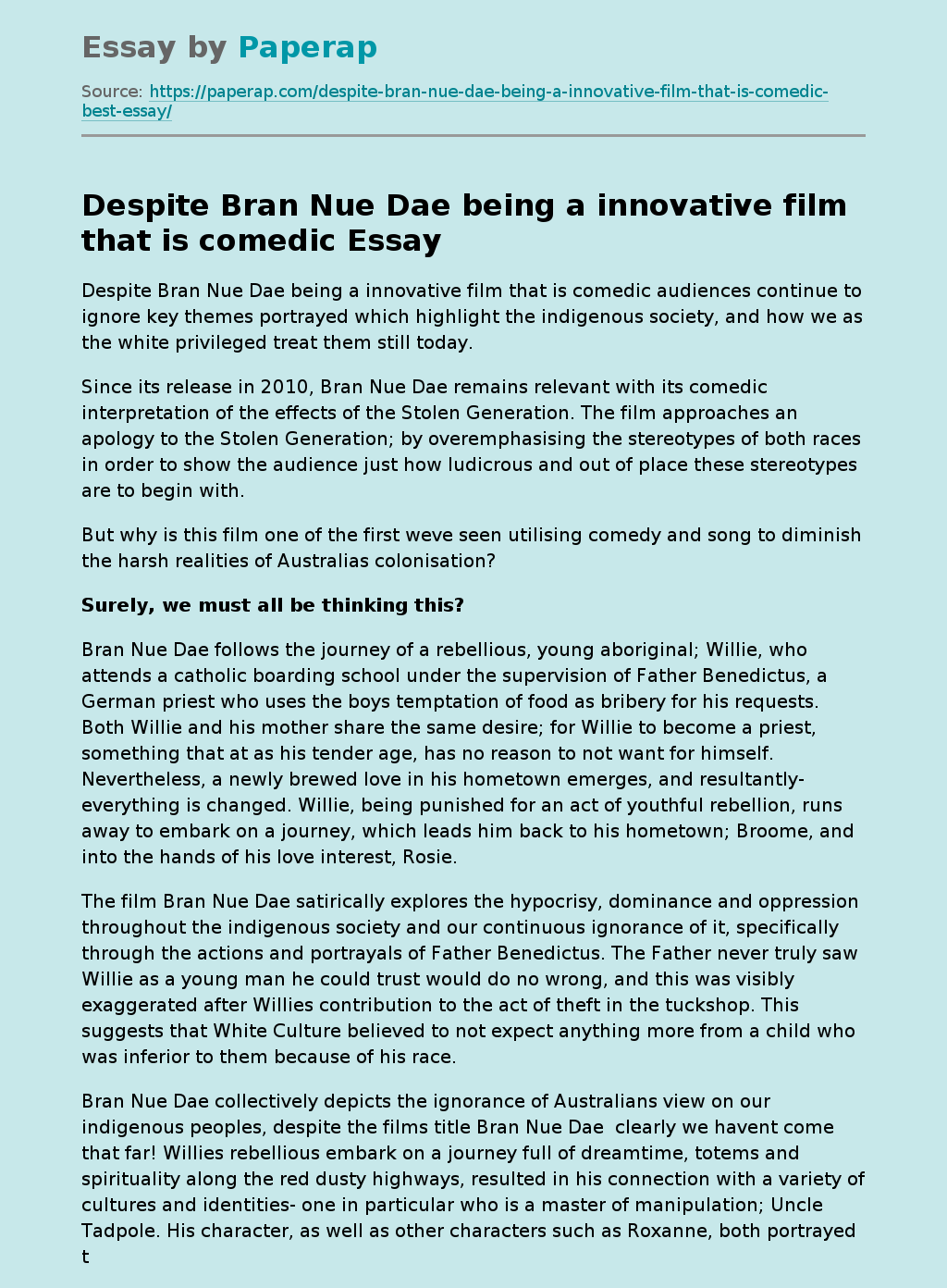Overlooked Themes in Bran Nue Dae
The following sample essay on: “Bran Nue Dae”. Despite Bran Nue Dae being a innovative film that is comedic audiences continue to ignore key themes portrayed which highlight the indigenous society, and how we as the white privileged treat them still today.
Since its release in 2010, Bran Nue Dae remains relevant with its comedic interpretation of the effects of the Stolen Generation. The film approaches an apology to the Stolen Generation; by overemphasising the stereotypes of both races in order to show the audience just how ludicrous and out of place these stereotypes are to begin with.
But why is this film one of the first weve seen utilising comedy and song to diminish the harsh realities of Australias colonisation?
Surely, we must all be thinking this?
Bran Nue Dae follows the journey of a rebellious, young aboriginal; Willie, who attends a catholic boarding school under the supervision of Father Benedictus, a German priest who uses the boys temptation of food as bribery for his requests.
Both Willie and his mother share the same desire; for Willie to become a priest, something that at as his tender age, has no reason to not want for himself. Nevertheless, a newly brewed love in his hometown emerges, and resultantly- everything is changed. Willie, being punished for an act of youthful rebellion, runs away to embark on a journey, which leads him back to his hometown; Broome, and into the hands of his love interest, Rosie.
The film Bran Nue Dae satirically explores the hypocrisy, dominance and oppression throughout the indigenous society and our continuous ignorance of it, specifically through the actions and portrayals of Father Benedictus.
The Father never truly saw Willie as a young man he could trust would do no wrong, and this was visibly exaggerated after Willies contribution to the act of theft in the tuckshop. This suggests that White Culture believed to not expect anything more from a child who was inferior to them because of his race.
Bran Nue Dae collectively depicts the ignorance of Australians view on our indigenous peoples, despite the films title Bran Nue Dae clearly we havent come that far! Willies rebellious embark on a journey full of dreamtime, totems and spirituality along the red dusty highways, resulted in his connection with a variety of cultures and identities- one in particular who is a master of manipulation; Uncle Tadpole. His character, as well as other characters such as Roxanne, both portrayed the typical drunkie, career deployed, homeless, troublemakers, who displayed what a large array of audiences still believe is the foundation of the Indigenous culture. However, the film is seen to also attempt at sharing with audiences character identities such as Willie and Rosie, who present aspirations and optimism for their future. With the presence of these two representations, a positive picture of the Indigenous Culture is created, still alluding to the often-appalling treatment of Aboriginals in the past.
Australias treatment of our Indigenous community, historically- is problematic to say the least. For almost 70 years- since the earliest years of invasion, we as white Australians have continually viewed Indigenous communities as people of no similarity even as a country, which is supposedly young and free.
The Australian Human Rights Commission, 2015 quotes when we compare Indigenous and non-Indigenous Australians on a range of life indicators, theres a devastating disparity.
Unfortunately, in spite of politicians attempting to gloss over the brutal acts we as Australians have created, there is no possible way of denying the offences against aboriginal humanity, which continue to take place. The Stolen Generation and Protection Law gave the government the legal opportunity to remove Indigenous children from their biological families, only to be placed in reformatory schools or homes of white heritage.
Colonisation plays a powerful theme throughout the film and is strongly represented by Father Benedictus who sees his act of raising the Aboriginal boys as the paternal face of assimilation.
The boys of the Catholic boarding school were consistently controlled with religion, being told that they will suffer if they were unable to obey their elders. This recognises that religion in the film wasnt being utilised as a source of happiness, but instead as a tool of oppression.
Father Benedictus, being a part of white culture, didnt believe Willies age was to blame, but instead his aboriginal origin. He often treated the schoolboys as useless black fellas, otten apples and labelled them as stains on humanity.
Father Benedictus in the hope of making Willie a priest, urged for Willie to follow in his footsteps, seeing his own person as being extremely successful. However, this belief shows strong irony because of the disclosure near the conclusion of the film, where Father Benedictus confessed to numerous affairs with women of the Indigenous Society.
Bran Nue Dae effectively highlights the affectation colonisation and assimilation
How would we feel if we were constantly faced with false acquisitions regarding our very own culture and identity? And what happened to what we call a Bran Nue Dae?
Overlooked Themes in Bran Nue Dae. (2019, Dec 15). Retrieved from https://paperap.com/despite-bran-nue-dae-being-a-innovative-film-that-is-comedic-best-essay/

